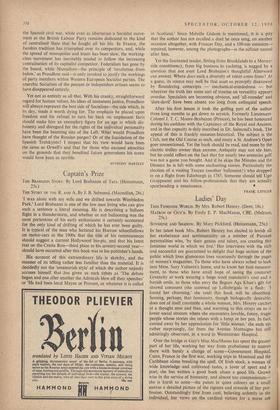Captain's Prize
ME STORY OF THE R. AND A. By J. B. Salmond. (Macmillan, 28s.) `I was alone with my wife and we drifted towards Wimbledon Park.' Lord Brabazon is one of the few men living who can give such a sentence a literal meaning. He is describing a balloon flight in a thunderstorm, and whether or not ballooning was the most portentous of his early enthusiasms it certainly accounted for the only kind of drifting of which he has ever been guilty. It is typical of the man who lectured his Harrow schoolfellows on motor-cars in the 1900s that the title of his reminiscences should suggest a current Hollywood bio-pic, and that his latest feat on the Crests Run—third place in his seventy-second year— should have occurred after this book was in his publisher's hands.
His account of this extraordinary life is sketchy, and the manner of its telling rather less familiar than the material. It is decidedly not the 'amateurish style' of which the author unjustly accuses himself that shas given us such titbits ,as 'The debate began and one after another the Admirals blew off their speeches' or 'He had been local Mayor or Provost, or whatever it is called in Scotland.' Since Melville Gideon is mentioned, it is a pity that the author has not recalled a duet he once sang, on another occasion altogether, with Frances Day, and a 100-ton omission— repaired, however, among the photographs—is the aitliner named after him.
Yet the fascinated reader, flitting from Brooklands to a Mersey- side constituency, from big business to yachting, is nagged by a question that not even Lord Brabazon's thoughtful Atterword can answer. Where does such a diversity of talent come from? At a guess, its source may well be that asset so promptly disavowed by floundering conscripts —' mechanical-mindedness — but wherever the truth lies some sort of treatise on versatility appears overdue. Specialists are becoming obvious, and 'all-rounder' and `dare-devil' have been absent too long from colloquial speech.
After his first lesson it took the golfing part of the author three long months to get down to scratch. Formerly Lieutenant- Colonel J. T. C. Moore-Brabazon (Princes), he has been honoured during his ,earldom with the Captaincy of the Royal and Ancient, and in that capacity is duly inscribed in Dr. Salmond's book. The appeal of this is frankly museum-historical. The subject is the Club, not the Old Course as such, and many a St. Andrew's Open goes unmentioned. Yet the book should be read, and more by the electric trolley owner than anyone. Antiquity may not stir him, but he could reflect on the fact that for nearly two centuries golf was not a game you bought. And if he skips the Minutes and the Dinners he is left with some enchanting stories. Particularly the election of a visiting 'Tuscan (another balloonist!) who dropped in on a flight from Edinburgh in 1785. Someone should tell Ugo Grappasoni and his fellow-professionals that they are actually
FRANK LITTLER










































 Previous page
Previous page